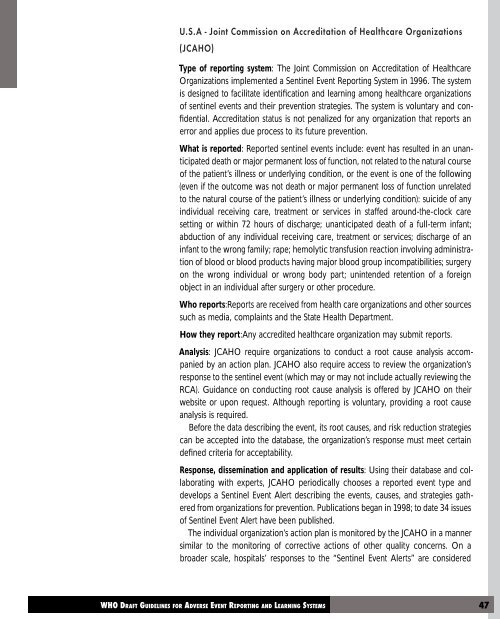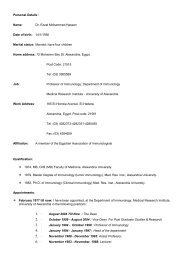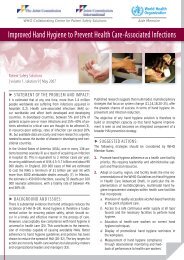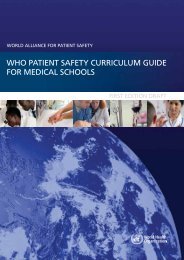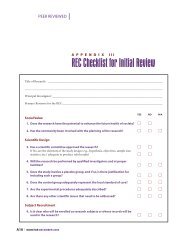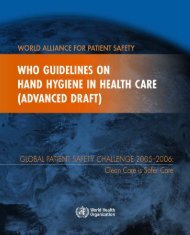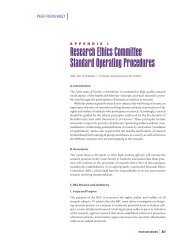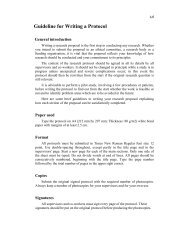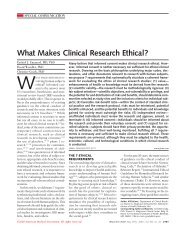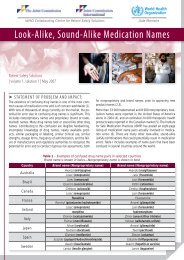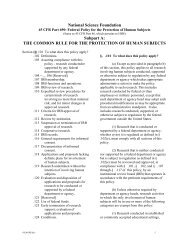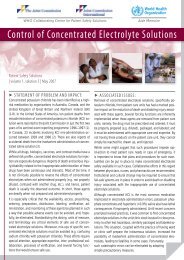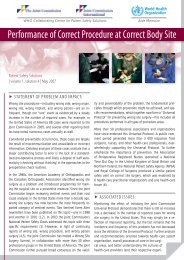Adverse event reporting.pdf
Adverse event reporting.pdf
Adverse event reporting.pdf
You also want an ePaper? Increase the reach of your titles
YUMPU automatically turns print PDFs into web optimized ePapers that Google loves.
U.S.A - Joint Commission on Accreditation of Healthcare Organizations<br />
(JCAHO)<br />
Type of <strong>reporting</strong> system: The Joint Commission on Accreditation of Healthcare<br />
Organizations implemented a Sentinel Event Reporting System in 1996. The system<br />
is designed to facilitate identification and learning among healthcare organizations<br />
of sentinel <strong>event</strong>s and their pr<strong>event</strong>ion strategies. The system is voluntary and confidential.<br />
Accreditation status is not penalized for any organization that reports an<br />
error and applies due process to its future pr<strong>event</strong>ion.<br />
What is reported: Reported sentinel <strong>event</strong>s include: <strong>event</strong> has resulted in an unanticipated<br />
death or major permanent loss of function, not related to the natural course<br />
of the patient’s illness or underlying condition, or the <strong>event</strong> is one of the following<br />
(even if the outcome was not death or major permanent loss of function unrelated<br />
to the natural course of the patient’s illness or underlying condition): suicide of any<br />
individual receiving care, treatment or services in staffed around-the-clock care<br />
setting or within 72 hours of discharge; unanticipated death of a full-term infant;<br />
abduction of any individual receiving care, treatment or services; discharge of an<br />
infant to the wrong family; rape; hemolytic transfusion reaction involving administration<br />
of blood or blood products having major blood group incompatibilities; surgery<br />
on the wrong individual or wrong body part; unintended retention of a foreign<br />
object in an individual after surgery or other procedure.<br />
Who reports:Reports are received from health care organizations and other sources<br />
such as media, complaints and the State Health Department.<br />
How they report:Any accredited healthcare organization may submit reports.<br />
Analysis: JCAHO require organizations to conduct a root cause analysis accompanied<br />
by an action plan. JCAHO also require access to review the organization’s<br />
response to the sentinel <strong>event</strong> (which may or may not include actually reviewing the<br />
RCA). Guidance on conducting root cause analysis is offered by JCAHO on their<br />
website or upon request. Although <strong>reporting</strong> is voluntary, providing a root cause<br />
analysis is required.<br />
Before the data describing the <strong>event</strong>, its root causes, and risk reduction strategies<br />
can be accepted into the database, the organization’s response must meet certain<br />
defined criteria for acceptability.<br />
Response, dissemination and application of results: Using their database and collaborating<br />
with experts, JCAHO periodically chooses a reported <strong>event</strong> type and<br />
develops a Sentinel Event Alert describing the <strong>event</strong>s, causes, and strategies gathered<br />
from organizations for pr<strong>event</strong>ion. Publications began in 1998; to date 34 issues<br />
of Sentinel Event Alert have been published.<br />
The individual organization’s action plan is monitored by the JCAHO in a manner<br />
similar to the monitoring of corrective actions of other quality concerns. On a<br />
broader scale, hospitals’ responses to the “Sentinel Event Alerts” are considered


